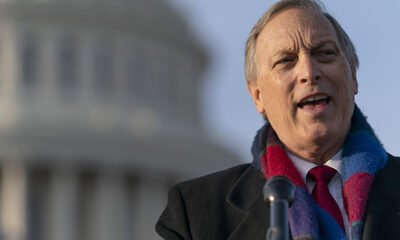Business
Early Voting Kicks Off Today in Arizona!

PHOENIX — The countdown to vote has officially begun. Early ballots for the general election are set to be distributed, and for those who prefer immediacy, remote early voting locations will be available in every county across Arizona.
This year’s election features critical contests, notably a battle for the state’s 11 electors, a potential game-changer in the national political landscape. A closely watched race between Republican Kari Lake and Democrat Ruben Gallego for the Senate seat, previously held by Kyrsten Sinema, adds to the intrigue.
Additionally, Arizona voters face significant choices, including three open seats on the Arizona Corporation Commission and decisions regarding the potential six-year terms of Supreme Court Justices Clint Bolick and Kathryn King.
A particular focus will be on 13 propositions that could define Arizona’s legislative landscape for years to come, as changing any approved measure requires another public vote. Among these, the 100 series addresses constitutional amendments, while the 300 series focuses on statutory changes that faced legislative hurdles.
Proposition 133 seeks to assure that each political party can nominate its candidates for the general election, promoting party ideologies in the voting process. Yet, critics argue this may further polarize elections by reinforcing extreme viewpoints.
Moving on, Proposition 134 introduces new signature requirements for ballot measures, mandating support from all 30 legislative districts. Supporters laud this as a means to include rural voices, but opponents fear it might sideline critical issues lacking statewide support.
Proposition 135 aims to bolster legislative oversight over emergency declarations made by the governor, allowing lawmakers to terminate emergencies sooner if necessary. Advocates claim this reinforces checks on executive power, while critics worry it could politicize essential emergency responses.
Proposition 136 would allow pre-election legal challenges to ballot initiatives on broader constitutional grounds. Supporters see this as a safeguard against flawed measures, but detractors argue it burdens proponents with unnecessary upfront costs.
Justice appointments are at stake in Proposition 137, which proposes limiting judicial retention votes. Critics emphasize that voters should maintain the final say over judges’ fates.
Several propositions relate to economic policy, including Proposition 138, which seeks to modify minimum wage structures, potentially affecting tipped workers. Proponents argue this supports employment in the hospitality sector, while opponents voice concerns about fair compensation.
Meanwhile, Proposition 139 introduces constitutional protections for abortion access, expanding rights up to fetal viability. This measure faces staunch opposition for allegedly allowing excessive leeway on abortion-related decisions.
Partisan changes continue with Proposition 140, which would institute nonpartisan primaries for all elections. Supporters hope this promotes inclusivity, but warnings exist that it could dilute party representation, especially in closely contested races.
Public safety measures are addressed in Proposition 311, providing additional benefits to the families of first responders killed on duty. While supporters believe it aids law enforcement recruitment, critics note existing benefits already available to families.
Proposition 312 proposes tax relief for property owners affected by local government failures to control homelessness. Advocates argue for homeowner compensation, yet others suggest redirecting funds towards problem-solving measures like shelters.
The tough stance on crime shines in Proposition 313, which would enforce life sentences for child sex trafficking convictions. Proponents defend its deterrent intent, while opponents question its effectiveness by advocating for judicial discretion in sentencing.
Lastly, Proposition 314 calls for strict enforcement of immigration laws at the state level, directing local police to arrest unauthorized border crossers. Critics worry this could lead to discriminatory practices and complicate the labor market.
Lastly, Proposition 315 reflects Republican efforts to limit state regulatory powers by imposing strict reviews of cost-increasing regulations. This measure aims to protect small businesses, yet opponents insist it could hinder essential public health initiatives.


















